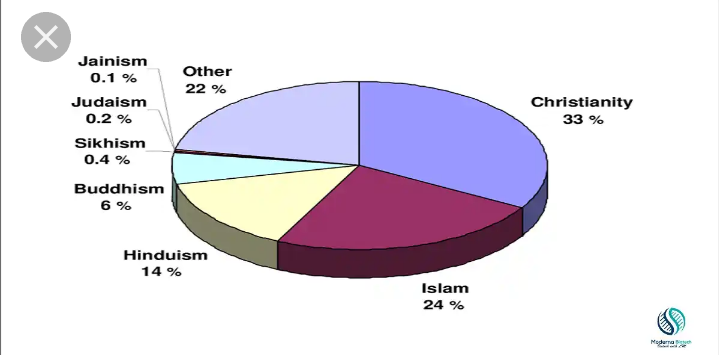Top 5 Most Popular Religions In The World

A person's thoughts, perceptions, and interactions with the outside world are influenced by their religion, which is a system of faith or worship. The primary source of someone's ethical and moral convictions is frequently their religion. Many believers find enormous solace and possibly even meaning in their religion. There are numerous distinct religions practiced worldwide.
It is debatable that most religions concentrate on two nearly common themes: how to behave on Earth and what to anticipate after death, despite the fact that their theologies and practices frequently diverge greatly from one another. The majority of religions encourage belief in a greater power, whether that power is one's own spirituality, nature, the God of Christians, Jews, and Muslims, or the Hindu deities Vishnu, Shiva, Ganesha, Shakti, e.t.c.
How Many Religions Exist in the World
There are several reasons why it is difficult, if not impossible, to determine the precise number of religions in the world. For people who are unfamiliar with the dogma of many religions, it might be challenging to distinguish between them. More importantly, it is difficult to find any rules about what constitutes a true independent religion and what is merely a denomination (subdivision).
To use Christianity as an example, the customs and doctrines of a traditional Mennonite church are very different from those of a contemporary Vineyard or Assembly of God church, although both are still regarded as belonging to the Christian faith. However, while having its roots in Islam historically, Sikhism is typically seen as being its own distinct faith.
The distinction between a spiritual but nonreligious experience and a genuine religion can vary from person to person; for instance, some people may regard Wicca, New Age activities, and even some types of yoga to be religions, while others may not. This is similar, but on a smaller scale. It is widely debated that there are as many as 4000–4300 different religions in the globe. To begin with, it contains long-gone religious traditions that are no longer followed in the present.
READ ALSO » Top 10 Modern Religions In The World
Additionally, it separates apart the numerous denominations within a single religion, so Christianity, for instance, would be counted as hundreds of different religions, including Protestant, Catholic, Lutheran, Methodist, Episcopalian, Assembly of God, Seventh Day Adventist, Mormon, and so on.
World Population by Religion
Around 85% of people worldwide identify as religious. Christianity is the most common religion globally, with an estimated 2.38 billion followers. The second most popular religion is Islam, which is followed by 1.91 billion people. But according to population experts, by 2050 Islam will have almost caught up to Christianity.
Along with two umbrella groups, other religions measured and predicted include Hinduism, Buddhism, and Judaism. The first is folk religions, which includes indigenous religions from Australia and North America as well as traditional African religions. The second category is other religions, which includes minor religions including Shintoism, Taoism, Sikhism, and Jainism. Finally, almost 1.2 billion people worldwide still identify as neither religious nor atheist.
Population Of Religions In The World 2023:
- Christianity - 2.38 billion
- Islam - 1.91 billion
- Hinduism - 1.16 billion
- Buddhism - 507 million
- Folk Religions - 430 million
- Other Religions - 61 million
- Judaism - 14.6 million
- Unaffiliated - 1.19 billion
1. Christianity
Christianity, which is practiced by over 2.4 billion people, is the largest religion in the world. Catholicism, Protestantism, and Eastern Orthodoxy are only a few of the many varieties of Christianity that fall under the categories of Eastern and Western theology. These branches then split into the tens of thousands of different denominations that are currently recognized, such as Baptists, Methodists, Lutherans, Seventh-Day Adventists, Mormons, Amish, and others.
2. Islam
In many countries, at least 95% of the population identify as either Sunni or Shi'a Muslim. Countries with populations that are at least 95% Muslim include: Maldives, Mauritania, Saudi Arabia, Afghanistan, Algeria, Comoros, Iran, Iraq, Kuwait, Libya, Morocco, Pakistan, Somalia, Sudan, Tunisia, Turkey, and Yemen. Islam is the second-largest religion in the world. People who practice Islam are known as Muslims.
3. Hinduism
The third-largest religion in the world is Hinduism. It is believed that Hinduism is a dharmic way of life. It has its roots in the Indian subcontinent and is commonly used in Southeast Asia today. The Vaishnavism, Shaivism, Shaktism, and Smartism are the four primary religious movements. India, unsurprisingly, has the highest proportion of Hindus but also the largest number of Hindus.
READ ALSO » Top 10 Oldest Religions In The World
Hindus make up 1.093 billion people in India, or 79.8% of the total population. Nepal has the second-highest proportion of Hindus, with 28.6, or 81.3% of the total population. India, Nepal, Bangladesh, Indonesia, Pakistan, Sri Lanka, the United States, Malaysia, the United Kingdom, and Mauritius are nations having sizable Hindu populations.
4. Buddhism
Based on the teachings of Buddha, Buddhism also has its roots in India. Buddhists have distinctive customs, ideals, and beliefs including rebirth. Worldwide, 507 million people practice Buddhism.
With 254.7 million people, China has the biggest number of Buddhists, followed by Thailand (66.1 million), Burma (Myanmar), 41.44 million people, and Japan (41.38 million). With 97.9% of the population, Cambodia has the highest proportion of Buddhists, followed by Thailand (94.6%) and Burma (Myanmar) (87.9%). The majority of the population in Cambodia, Thailand, Burma/Myanmar, Sri Lanka, Laos, Mongolia, and Bhutan is Buddhist.
5. Other Religions
Traditional Chinese faiths like Confucianism and Taoism are practiced in several countries. China, Hong Kong, Macau, and Taiwan are the countries where one is most likely to encounter this. Many nations practice indigenous religions and ethical systems. An estimated 50% of people in Guinea-Bissau and Haiti practice one of these religions. Guinea-Bissau, Haiti, Benin, Burundi, Cameroon, Cote d'Ivoire, Sudan, and Togo are some countries where ethnic and indigenous faiths are practiced.
